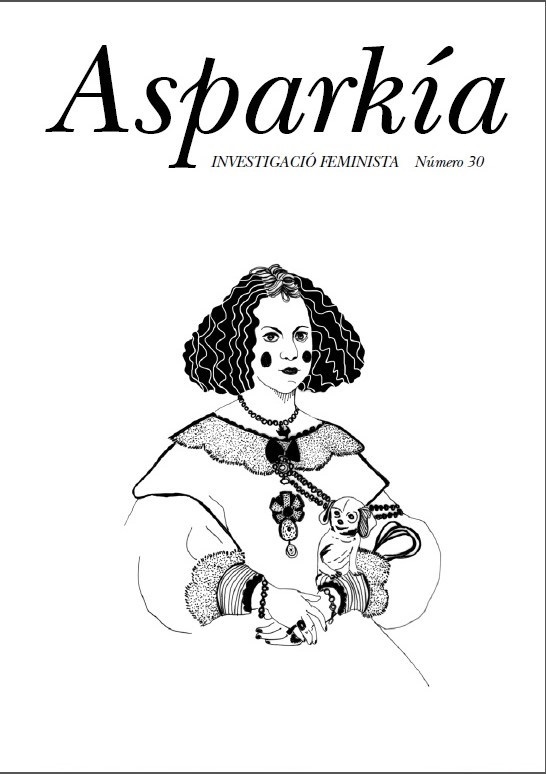Orientalisme i gènere: Flaubert i la mirada colonial sota les dones / Orientalism and gender: Flaubert and colonial eyes about women
Contenido principal del artículo
Resumen
Resum
La representació de la feminitat oriental en la literatura dels països colonitzadors al llarg del segle XIX tingué un paper clau en els discursos orientalistes del romanticisme. La imatge dels cossos orientals femenins, la qual dibuixa a les dones com a objectes eròtics del plaer visual masculí, ha contribuït a configurar un escenari eurocèntric. Aquesta figuració qualifica a diferents territoris extraeuropeus d’escassament civilitzats i monolítics, i sobretot feminitzats i susceptibles a ser colonitzats. Dintre d’aquests discursos orientalistes multidireccionals, escollim a Gustav Flaubert com a cànon literari de les diverses al·legories de les dones orientals, les quals basculaven entre la no-existència femenina fins la femme fatale, passant per la dona feble i necessitada de l’heroi occidental per al seu alliberament.
Paraules clau: Orientalisme, Flaubert, dones orientals, colonització, literatura, representacions, gènere.
Abstract
The representation of the oriental femininity in the settler countries throughout the XIX century had a key role in the orientalists speeches of Romanticism. The feminine oriental bodies image, which exemplifies women as erotic objects of the male visual pleasure, has contributed to the configuration of a stage where Europe is considered the universal center. This image itself qualifies different extra-european territories as monolithic and with lack of civilization, but especially feminized and available to be colonized. Considering all these speeches, Gustav Flaubert has been chosen as literary cannon of the several representations that the oriental women can have. These allegories were searching from the feminine noexistence until the femme fatale, also seeing the weak woman who needed the occidental hero to achieve their liberty.
Keywords: Orientalism, Flaubert, oriental women, colonization, literature, representations, gender.
Descargas
Detalles del artículo
Citas
Carabí, Àngels & Segarra, Marta (eds.) (1998): Belleza escrita en femenino. Barcelona: Mujeres y literatura.
Djebar, Assia (2006): Out of Algeria. Liverpool: Liverpool University Press.
Elmarsafy, Ziad; Bernard, Anna; Attwell, David (eds.) (2013): Debating Orientalism. London: Pacgrave Macmillan.
Flaubert, Gustave (1987): Cartas del Viaje a Oriente. Barcelona: Laertes.
– (1989): Cartas a Louise Colet. Madrid: Ediciones Siruela.
– (1995): Les temptacions de Sant Antoni, Barcelona, Proa.
Foucault, Michel (1991): Historia de la sexualidad. Madrid: Siglo Veintiuno Editores.
Kahf, Mohja (1999): Western Representation of the Muslim Woman: From Termagant to Odalisque. Austin: University of Texas Press.
Lassner, Jacob (1993): Demonizing the Queen of Sheba. Boundaries of Gender and Culture in Postbiblical Judaism and Medieval Islam. Chicago: The University of Chicago Press.
Martin Varisco, Daniel (2007): Reading Orientalism: Said and the Unsaid. Seattle: University of Washington Press.
Mendola, Tara (2006): Magrebines: Historical Representations of North African Women in 19th-Century French Orientalism and Post-1950s North African Narrative. Pennsylvania: Penn Humanities Forum on Word & Image.
Mignolo, Walter D. (2005): La razón postcolonial: herencias coloniales y teorías postcoloniales. Buenos Aires: AdVersuS, Nº 4.
Mohanty, Chandra Talpade (1988): «Under Western Eyes: Feminist scholarship and colonial discourses». En Patrick WILLIAMS y Laura CHRISMAN (eds.): Colonial Discourse and Post-Colonial Theory: A Reader. Hertfordshire: Prentice Hall/Harvester Wheatsheaf, p. 196-220.
O’riley, Michael F. (2007): Postcolonial Haunting and Victimization: Assia Djebar’s New Novels. New York: Peter Lang.
Oxfeldt, Elisabeth (2005): Nordic Orientalism: Paris and the Cosmopolitan Imagination 1800-1900. Copenhagen: Museum Tusculanum Press.
Pateman, Carole (1995): El contrato sexual. Barcelona: Anthropos.
Rose, Sonya O. (2010): ¿Qué es historia de género?. Alianza editorial, 2012 (traducción Noelia Adánez).
Scott, Joan W. (1990): «El género: una categoría útil para el análisis histórico». En James S. Amelang Mary Nash (coord): Historia y género: las mujeres en la Europa Moderna y contemporánea. València: Edicions Alfons el Magnànim, p. 23-58.
Said, Edward (2002): Orientalismo. Barcelona: Debolsillo.
Sales Salvador, Dora (2006): Traducción, género y poscolonialismo Compromiso traductológico como mediación y affidamento femenino. Barcelona: Quaderns, Nº 13.
Sharafuddin, Mohammed (1996): Islam and Romantic Orientalism: Literary encounters with the Orient: New York: I. B. Tauris Publishers.
Sinha, Mrinalini (1995): Colonial Masculinity, The Manly Englishman and the Effeminate Bengali in the Late Nineteenth Century. Manchester: Manchester University Press.
Spivak, Gayatri Chakravorty (1988). «Can the subaltern speak?». En Patrick WILLIAMS y Laura CHRISMAN (eds.): Colonial Discourse and Post-Colonial Theory. A Reader. Hertfordshire: Prentice Hall/Harvester Wheatsheaf, p. 66-111.


